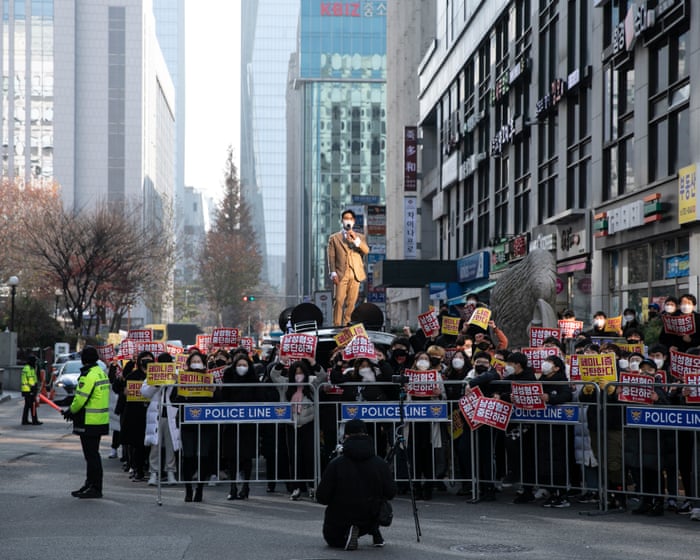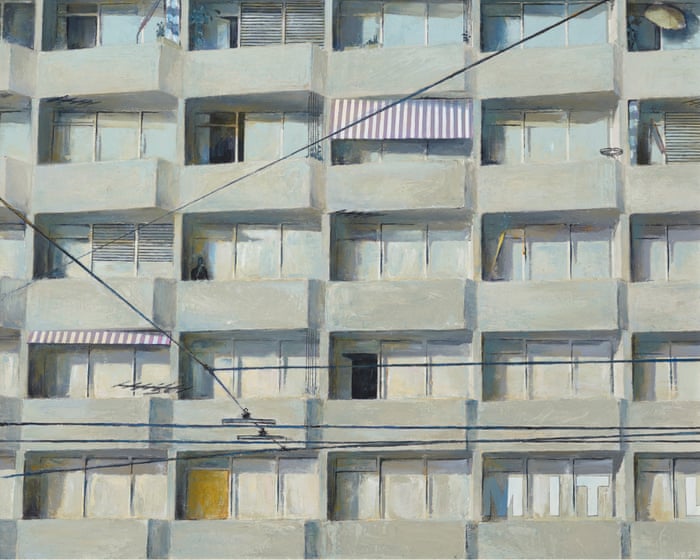On a November evening in 2023 in Jinju, South Korea, a woman named On Ji-goo was working the late shift at a convenience store when a young man burst in, violently knocking items off the shelves. When she asked him to be careful, he turned to her and said, “I’m angry to my bones right now, so don’t touch me.”
The situation quickly worsened. When On tried to call for help, he snatched her phone and threw it into the store’s microwave. She tried to stop him, and he grabbed her by the collar and arms, dragging her several meters and slamming her into display shelves. It was the beginning of a brutal attack. Throughout the assault, he repeatedly claimed he “never hits women” but insisted that feminists “deserve to be beaten.”
When an older male customer attempted to intervene, the attacker turned on him as well, demanding, “Why aren’t you supporting a fellow man?” When police arrived, he announced he was part of a men’s rights group and insisted that only male officers handcuff him. He later admitted he had targeted On because of her short hair.
“Before this, I only had a basic understanding of feminism—the kind any woman might naturally have,” says On, an aspiring author who uses a pen name.
We meet on a sunny afternoon at a coffee shop in Jinju, where she still lives, just a few blocks from the store. Jinju is a quiet provincial city of fewer than 350,000 people, a four-hour high-speed train ride from Seoul. On wears a face mask and a beanie pulled low. After facing insensitive questioning from local media following the attack, she takes time to lower her guard. “I didn’t fully grasp the discrimination women face, or rather, I had accepted it as normal,” she says.
The assault left her with permanent hearing loss and severe trauma. The perpetrator was sentenced to three years in prison. In a landmark ruling, the appeals court recognized misogyny as the motive behind the attack—the first time a South Korean court had acknowledged such hatred as a criminal driving force.
On’s story is not unique in a country where systemic inequality and intense online misogyny have pitted mainly Gen Z and millennials in a bitter battle between the sexes. While similar conflicts over gender and feminism are happening worldwide, from the US to Europe, South Korea has become ground zero for gender wars. Its highly connected, digitally fluent population has amplified this trend at an unprecedented pace.
In male culture, you can’t speak up to those above you. So where does that frustration go? Sideways, at women.
On the surface, South Korea appears to be a hypermodern society, known for its global pop culture influence, cutting-edge technology, and sleek cities. But beneath that surface lies a widening gender divide that seems to belong to another era. Among OECD nations, South Korea ranks first for women’s higher education attainment, yet it has the largest gender pay gap in the bloc. Women remain largely excluded from leadership roles, and the country consistently ranks last in workplace gender equality measures. While South Korea leads the world in internet connectivity and tech innovation, these same digital spaces have become breeding grounds for some of the most toxic anti-feminist communities, turning online hatred into real-world violence.
The most horrifying example of this came in 2016, when a 23-year-old woman was brutally murdered in a public restroom near Seoul’s Gangnam station, in the heart of the city’s business and entertainment district. The killer, who waited hours for a random female victim, told police he did it because “women have always ignored me.” The case became a turning point, sparking massive protests, yet the digital targeting of women continued. By 2018, it had become so normalized that signs in public restrooms routinely confirmed they had been checked for hidden cameras.Thousands of women have protested against an epidemic of spy cameras and “revenge porn.” The crisis worsened in 2020 with the notorious “nth room” case, a digital sexual slavery scheme where users of Telegram chatrooms blackmailed women and underage girls into creating explicit content at home. In 2024, a new threat emerged: deepfake pornography targeting schoolgirls. Perpetrators, often minors themselves, used AI to superimpose women’s faces onto explicit material and distributed the images through Telegram channels, some with hundreds of thousands of members.
These digital crimes did not arise in isolation. In the darkest corners of South Korea’s internet, young men gather anonymously to share their anger. While the West has platforms like 4chan and Reddit, South Korea has Ilbe—short for “daily best”—which at its peak in the mid-2010s was among the country’s top 10 most visited websites. The forum’s influence extends far beyond the digital world. Its users coined derogatory terms like “kimchi-nyeo” (often translated as “kimchi bitch”) to mock women as materialistic gold-diggers. These terms soon entered mainstream discourse, with media outlets using “-nyeo” suffixes in headlines to criticize women behaving badly in public.
As Ilbe grew, it became more radical, aligning with far-right politics and organizing provocative offline stunts. In 2014, an Ilbe user set off a homemade explosive at a progressive activist’s talk, accusing the speaker of being pro-North Korea—a common right-wing charge in a country where Cold War divisions still shape left-right politics. Others taunted families of the 2014 Sewol ferry disaster victims by eating pizza in front of bereaved parents who were on hunger strike, demanding new legislation after the tragedy.
Although Ilbe’s popularity has declined, its legacy lives on in online communities known as “namcho,” short for “namseong chogwa,” meaning “excess of men.” These male-dominated spaces have spread across forums and messaging apps, where young men share grievances about feminism and what they perceive as reverse discrimination.
“If you get access to the open internet before you receive a formal education, your worldview will be messed up,” says Kim Min-sung, speaking from his office in Guri, a city on the eastern edge of Seoul. The 22-year-old activist, once an anti-feminist himself, speaks with infectious energy, lightening serious points with bursts of laughter.
Like many Korean boys, Kim encountered these forums at a young age. He recalls searching for innocent content, like funny videos, only to be gradually exposed to misogynistic material. He admits he repeated anti-feminist rhetoric without understanding it, simply because everyone around him was doing the same.
Kim’s perspective changed through an unlikely source: fantasy role-playing games. There, he found a community that was mostly female and progressive. At first, he says, “I kept my mouth shut and just played Dungeons & Dragons. But listening to them, you naturally have casual conversations and realize the worldview from those online forums was just exaggerations, caricatures, and fantasy.”
Today, Kim runs the Korean Game Consumer Society, fighting the same online hatred he once took part in. He now regularly receives death threats, which he says feel oddly validating. Still, he reflects, “I’m just battling symptoms. I don’t think what I’m doing solves the core of the problem. Men don’t know why they ended up in this place; they don’t know why they became unhappy.”
According to Professor Seungsook Moon, a sociologist and gender studies expert at Vassar College in the U.S., the anger exploding online stems from…”Make our voices heard”: Jeong Yeong Eun of the Seoul Women’s Association. Photograph: Jun Michael Park/The Guardian
In April, South Korea’s constitutional court unanimously upheld the impeachment of Yoon, ruling that his declaration of martial law was a “grave betrayal of the people’s trust.” A snap election followed in June 2025, with Lee Jae Myung of the Democratic Party winning 49.42% of the vote.
Lee Jun-seok came to symbolize the depth of South Korea’s gender divide. His controversial remarks about chopsticks may have cost him votes, but they strengthened his appeal among his core supporters. Although he received only 8.34% of the national vote, exit polls revealed a sharp gender and age split: nearly one in four men in their 20s voted for him, along with 17.7% of men in their 30s. Disillusioned with mainstream candidates, they rallied behind a figure who voiced their frustrations with feminism, military service, and what they perceived as reverse discrimination. Even the new president, Lee Jae Myung, seemed to acknowledge this sentiment in July when he asked his cabinet to study “male discrimination” and propose solutions.
This gender-based political divide is not unique to South Korea—it reflects a global trend where young women lean left and young men shift right. However, the “ideology gap” is most extreme in South Korea, where economic pressures and changing values have intensified the split, according to political scientist Min Hee Go of Ewha Womans University in Seoul. “It’s about who gets more of the pie—material resources, job opportunities, even good partners,” she says. “It’s very cut-throat, especially in an environment where young people face unprecedented competition.”
This year’s election also highlighted concerns about women’s participation in South Korean politics. For the first time in 18 years, none of the six presidential candidates was a woman.
As the gender conflict has escalated, even those opposing misogyny have sometimes adopted toxic tactics. What began as “mirroring”—turning misogynistic rhetoric back at men—spiraled into increasingly extreme forms of resistance. When male forums mocked women’s bodies, feminists from Megalia—an online community formed in 2015—ridiculed penis size. When women were called “kimchi bitches,” Megalians coined terms like hannam-chung (“Korean male bug”). Though Megalia no longer exists, it remains a symbol used by critics to undermine feminist activism.
In the past year, global attention has turned to the fringe “4B” movement, which advocates complete withdrawal from what it sees as an irredeemably patriarchal system. Followers reject dating, marriage, childbirth, and any romantic involvement with men.
Such radical responses have fueled a broader backlash against feminism. Even those who support gender equality often distance themselves from the term, which has become almost like a slur. Today, mere accusations of feminist leanings can prompt public apologies from companies.
In 2023, a seemingly harmless animation in a promo for the game MapleStory sparked outrage. It showed a character’s hand gesture changing from a fist to a heart, but some male gamers claimed one frame resembled a feminist hand signal mocking small male genitalia. Online forums erupted within hours. The studio apologized, and anonymous users scoured the social media accounts of female employees, searching for evidence of feminist views. When they identified a female artist they perceived as an enemy, they demanded she be fired immediately.
The company, initially prepared to comply, later changed its stance.The company only changed course after the Korean Game Consumer Society intervened, persuading management to stand up to the online backlash. Ironically, it later came out that the animation had actually been created by a man in his 40s. Still, the female artist was doxed and subjected to sexual harassment online.
Some activists are working behind the scenes to tackle the deeper issues behind South Korea’s gender divide. In his cozy, cabin-style office near Seoul’s Mangwon market, Lee Han is getting ready to travel across the country to lead classroom discussions on gender-based violence. It’s a careful balancing act—schools often ask him to steer clear of controversial topics. But Lee and his group, Feminism With Him, believe dialogue is essential: “We need to speak up and share what we’ve learned.” What started as a small feminist book club in 2017 has grown into something bigger. Now, with eight active members, they organize discussions, join political rallies, and create spaces for honest conversations about gender.
Lee’s perspective is shaped by his own experience during military service: “It was miserable. You can’t put your hands in your pockets, listen to music, or easily drink or smoke. Having your freedoms taken away is traumatic and terrifying.” Today, he also teaches gender equality to military leaders and senior officers, arguing that men who blame women are misdirecting their anger. “Who created this system? Men, not feminists. Male politicians and the establishment decided: men are strong, women are weak, so don’t send women to the military,” he says. Despite calls for reform, the defense ministry has no plans to introduce conscription for women.
Efforts to address these issues face strong opposition, especially from South Korea’s influential conservative Christian lobby, which has blocked anti-discrimination legislation for nearly 20 years. “I’ve been barred from speaking at schools because they accused me of promoting feminism,” Lee says. Yet he and his colleagues press on. Though their numbers are small, their work offers hope that dialogue is possible. “Young men can’t express their fears and anxieties,” Lee explains. “In Korean male culture, where hierarchy is deeply rooted in Confucian values, you can’t speak up to those above you. So where does that frustration go? It gets aimed sideways, at women—the easier target.” By creating safe spaces for men to talk openly, groups like his aim to channel that anger into constructive change.
Back in Jinju, On is still recovering from the attack—she recently spent a month in hospital dealing with trauma. After a year dominated by court proceedings, she just wants life to return to normal: “I want to find work, treat my family to meals, and buy toys for my cat.”
She has been touched by the support from strangers. When a petition calling for her attacker to be punished gathered 50,000 signatures in less than a month, she created a social media account to thank her supporters. Gradually, she began sharing detailed updates about her court case, drawing so many people to the trial that some had to stand. She continues to post about similar cases, seeing it as a small way to stand in solidarity with other victims.
“I wouldn’t have made it through the year without the people who stood by me,” she says. For On, the solution isn’t about arguing over who faces more discrimination. “We need to focus on resolving these conflicts and building a safer society for everyone,” she says.
Frequently Asked Questions
Of course Here is a list of FAQs about the topic Why men are unhappy the toxic gender conflict dividing South Korea designed to be clear and helpful
BeginnerLevel Questions
1 What is the gender conflict in South Korea
Its a deep and often hostile divide between many young men and women in the country They frequently view each other as adversaries in a struggle over rights opportunities and social status rather than as allies
2 Why are young South Korean men so unhappy
Many feel that modern feminism and government policies aimed at helping women have put them at a disadvantage They point to issues like mandatory military service for men intense competition for jobs and housing and a sense that their struggles are being ignored
3 What is reverse discrimination
This is a term used by some men who feel that efforts to achieve gender equality have now gone too far and are unfairly penalizing men making it harder for them to succeed
4 Is this conflict just online or is it in real life too
While it is heavily amplified and organized on online forums the tension has realworld consequences It influences voting patterns sparks public protests and affects dating and social interactions between young men and women
Advanced Detailed Questions
5 How does mandatory military service play into this
South Korea requires all ablebodied men to serve around 18 months in the military This is seen as a major career and life disruption that women do not face Many men feel this sacrifice is not acknowledged and that they are still labeled as privileged
6 What role do online communities like Ilbe play
Websites like Ilbe serve as hubs for men who share these grievances They often spread antifeminist sentiments organize boycotts of companies perceived as profeminist and influence political discourse further polarizing the debate
7 How has this conflict affected politics
Politicians particularly conservative ones have begun to openly court the antifeminist male vote President Yoon Suk Yeol for example campaigned on abolishing the Ministry of Gender Equality and Family arguing it unfairly discriminates against men
8 What is the 3D dirty difficult dangerous work argument
Men often argue that they are overwhelmingly the ones who perform societys most undesirable physically demanding



